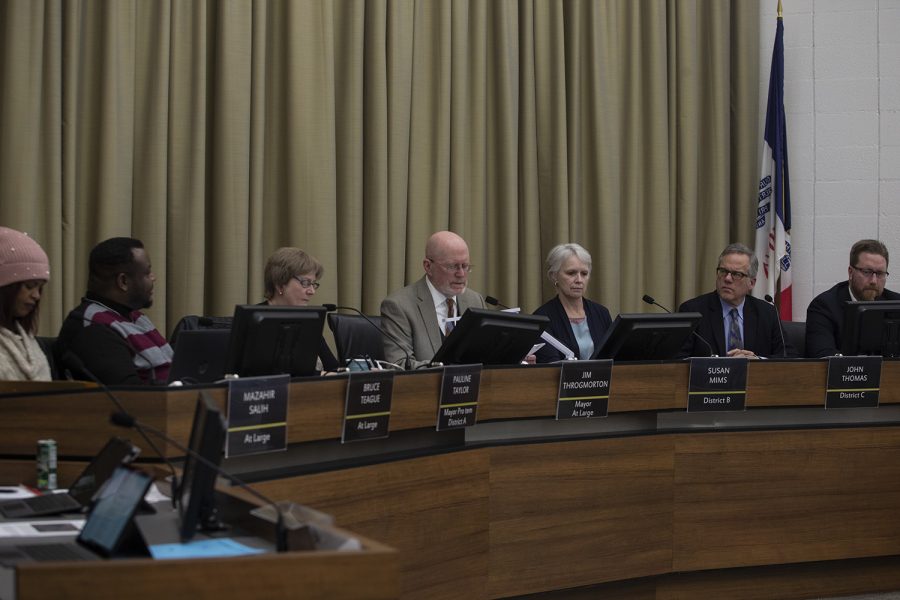City Council discusses current limitations when regulating carbon emissions
Iowa Code says the city cannot legally adopt stricter codes than the state.
The council deliberates at a meeting of the Iowa City Council on February 19, 2019
July 3, 2019
Climate change was on the minds of the Iowa City city councilors this week as they discussed their concerns with legislative limitations on tackling reducing emissions.
In light of the protests from the local climate strikers demanding stricter energy-efficiency regulations and the declaration of climate emergency, the council discussed Iowa City’s progress in reducing emissions, how the state has limited its regulatory ability, and whether to declare an emergency.
According to Iowa Code, relayed by City Attorney Eleanor Dilkes and in an email from Catherine Lucas, the general counsel for the Department of Public Safety, Iowa City cannot legally adopt anything other than the state energy code. This means the city cannot legally adopt codes stricter than the 2012 International Energy Conservation Code.
Some councillors were confused by this ruling in the code because of recent developments by Des Moines and Dubuque to have stricter regulations on carbon emissions.
A presentation by city Sustainability Coordinator Brenda Nations laid out statistics on the town’s reduction in carbon emissions since 2005. Nations said the city is ahead of schedule with a 21 percent reduction in emissions, despite an upward tick in emissions from 2017 to 2018. Nations said the weather extremes of 2018 caused the increase. Hotter summers and colder winters require more electricity and natural gas for heating and cooling.
Mayor Jim Throgmorton said he was concerned about the slight upward trend of the city’s carbon emissions since 2016.
“It just worries me that we’re saying we’ve already reduced carbon emissions by 21 percent, and therefore, we’re very close to achieving our 2025 goal,” he said. “I’m not persuaded that we’re going to get there.”
In the 85-page city Climate Action Plan, the goals for carbon-dioxide-emission reduction is 25 to 28 percent by 2025 and 80 percent by 2050.
There was some disagreement among the councilors when discussing whether to declare a climate emergency.
Councilor John Thomas expressed interest in declaring something and making sure the declaration has clarity. His suggestion was, if there were a declaration, to call it a declaration of climate crisis rather than emergency.
“I think it’s important insofar as to me it better reflects what we’re attempting to do here and what we’re responding to,” Thomas said.
Councilor Rockne Cole said the councilors should make a declaration, while factoring in the “credibility gap” between rhetoric and the city’s actual capability. The rhetoric will precipitate action, he said, and the municipalities should be “unshackled” to be more strict with emissions restrictions.
“I have felt a lack of urgency and what we’ve done so far has not worked, it has not been sufficient, and I think we need to move forward with that declaratory statement,” Cole said.
Councilors Pauline Taylor and Bruce Teague, who were hesitant to make a declaration, said such a declaration would functionally be more symbolic.



